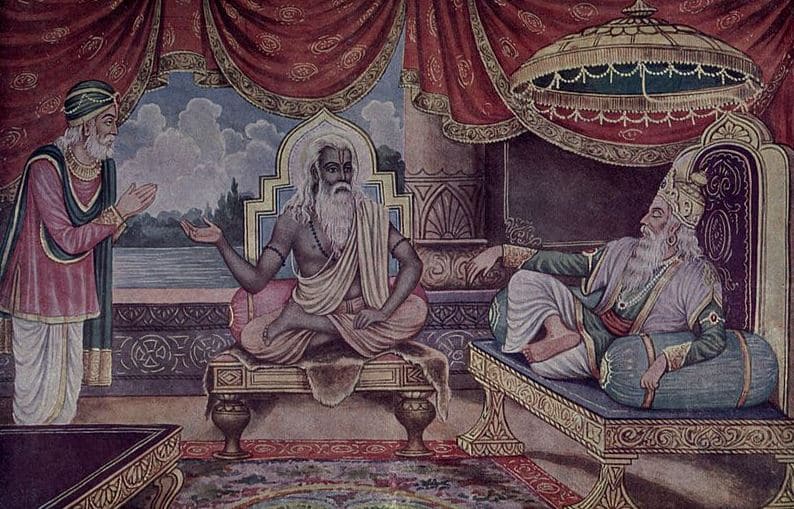Introduction
Embark on an enchanting journey through the realms of ancient epics and timeless fables as we uncover the authors behind some of India’s most revered literary works. From the majestic narrative of Ramayana to the wisdom embedded in Panchatantra, and the devotional fervor of Ramcharitmanas, this exploration delves into the rich tapestry of cultural and literary heritage. Additionally, we navigate the gender dynamics in authorship, shedding light on the author’s identity within a historical and social context.
Valmiki – The Sage Behind Ramayana
Introduction to Valmiki
Commence the exploration by introducing Valmiki, the revered sage traditionally attributed as the author of Ramayana. Unravel the historical and mythological context surrounding Valmiki, setting the stage for the epic narrative that unfolds under his authorship.
Maharishi Valmiki (/vɑːlˈmiːki/;[2] Sanskrit: वाल्मीकि, Vālmīki [ʋɑːlmiːki])[A] was a legendary poet who is celebrated as the traditional author of the epic Ramayana, based on the attribution in the text itself.[3][5] He is revered as Ādi Kavi, the first poet, author of Ramayana, the first epic poem.
Ramayana – Epic of Virtue and Dharma
Dive into Ramayana, exploring its significance as an epic that transcends time and space. Examine the moral and ethical dimensions of the narrative, tracing the journey of Lord Rama and the profound impact of Valmiki’s storytelling on Indian cultural ethos.
Valmiki’s Legacy and Influence
Explore Valmiki’s enduring legacy beyond Ramayana. Discuss his contributions to Sanskrit literature, philosophical perspectives embedded in his works, and the lasting influence of his poetic expressions on subsequent generations.
Sage Vyasa and the Panchatantra Wisdom

Vyasa’s Role in Panchatantra
Transition to Sage Vyasa’s association with Panchatantra. Discuss the historical context and the narrative framework that positions Vyasa as a transmitter of the fables encapsulated in Panchatantra.
Panchatantra – Lessons in Morality
Delve into the timeless wisdom of Panchatantra, a collection of fables imparting moral and practical lessons. Explore the narrative diversity within Panchatantra and its role in shaping the ethical consciousness of readers across cultures.
Vyasa’s Multifaceted Contributions
Examine Vyasa’s multifaceted contributions to literature. Uncover his role not only as a compiler of epics but also as a disseminator of wisdom through fables, showcasing the versatility of his literary endeavors.
Gender Dynamics in Authorship
Historical Context of Authorship
Provide a historical context for understanding gender dynamics in authorship. Explore how societal norms and cultural frameworks have influenced the recognition and representation of authors, particularly those identifying with feminine gender.
Unveiling Authorship Identity
Examine the challenges and nuances associated with unveiling authorship identity, particularly in cases where the gender of the author may be ambiguous or subject to historical misattributions. Explore instances where the identity of the author is debated or obscured.
Authorship Recognition for Feminine Voices
Highlight the evolving recognition of feminine voices in literature. Discuss historical and contemporary efforts to acknowledge and celebrate the contributions of women authors, emphasizing the importance of inclusivity in literary narratives.
Tulsidas – Devotion in Ramcharitmanas
Introduction to Tulsidas
Shift focus to Tulsidas, the revered poet-saint traditionally credited as the author of Ramcharitmanas. Explore Tulsidas’s background, spiritual journey, and the cultural milieu that inspired the composition of this devotional masterpiece.
Ramcharitmanas – Devotional Epic
Delve into the devotional fervor of Ramcharitmanas, a work that narrates the life of Lord Rama in the vernacular language. Uncover the poetic beauty, devotional intensity, and cultural impact embedded in Tulsidas’s magnum opus.
Tulsidas’s Devotional Legacy
Explore Tulsidas’s enduring legacy as a devotional poet. Discuss how Ramcharitmanas has become a cornerstone of devotional practices, inspiring millions and solidifying Tulsidas’s place as a revered figure in the Bhakti movement.
Conclusion: Threads of Legacy and Literary Continuity
this exploration has unraveled the mystique surrounding the authors of Ramayana, Panchatantra, and Ramcharitmanas, inviting readers into the rich tapestry of India’s literary heritage. As we traverse through the wisdom of Valmiki, Vyasa, and Tulsidas, and contemplate the gender dynamics in authorship, we witness the enduring power of storytelling and the diverse voices that contribute to the cultural continuum. These literary legacies, intertwined with historical, moral, and devotional threads, serve as timeless beacons that illuminate the path of understanding, contemplation, and cultural continuity.
